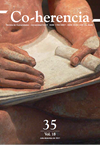Necesidad y coincidencias en Aristóteles. Una interpretación de Metafísica VI 3 y XI 8
Main Article Content
Keywords
Accidentes, causalidad, coincidencias, determinismo, predeterminación, necesidad
Resumen
Este artículo presenta una interpretación de dos discutidos pasajes de Metafísica VI 3 y XI 8 en los que se encuentra la argumentación de Aristóteles encaminada a evitar la necesidad universal con base en la existencia de las coincidencias. Esta argumentación ha suscitado múltiples e incompatibles interpretaciones desde la Antigüedad hasta nuestros días. En ellas se ha presentado la argumentación del Estagirita en un abanico que va desde comprenderla como una postura compatible con el más fuerte determinismo, hasta una que requiere un muy generalizado indeterminismo. En diálogo con estas interpretaciones, se defenderá una lectura según la cual estos pasajes están diseñados para argumentar no contra el determinismo causal sino contra la predeterminación.
Descargas
Referencias
[Cael.] (1965). Aristote. Du ciel (Ed. P. Moraux). Les Belles Lettres.
[EE] (1884). Aristotelis Ethica Eudemia (Ed. F. Susemihl). Teubner.
[EN] (1984). Aristotelis Ethica Nicomachea ( Ed. I. Bywater). Oxford Clarendon Press.
[GA] (1965). Aristotelis De Generatione Animalium (Ed. H. J. Drossaart Lulofs). Oxford Clarendon Press.
[GC] (1966). Aristote. De la génération et de la corruption (Ed. C. Mugler). Les Belles Lettres.
[Int.] (1949). Aristotelis categoriae et liber de interpretatione (Ed. L . Minio-Paluello). Oxford Clarendon Press.
[Metaph.] (1924). Aristotle’s Metaphysics (Ed. W. D. Ross; 2 vols.). Oxford Clarendon Press.
[PA] (1956). Aristote. Les parties des animaux (Ed. P. Louis). Les Belles Lettres.
[Ph.] (1956). Aristotelis Physica (Ed. W. D. Ross). Oxford Clarendon Press.
[Rh.] (1959). Aristotelis Ars Rhetorica (Ed. W. D. Ross). Oxford Clarendon Press.
Balme, D. (1939). Greek Science and Mechanism: I. Aristotle on Nature and Chance. The Classical Quarterly, 33(3/4), 129-138. https://www.jstor.org/stable/637273
Boeri, M. (1995). Chance and Teleology in Aristotle’s Physics. International Philosophical Quarterly, 35(1), 87-96. https://doi.org/10.5840/ipq199535161
Cicerón (1991). De Fato. En R. W. Sharples (Ed.), On Fate & Boethius the Consolation of Philosophy. Aris & Phillips.
De los Ríos, I. (2015). La dimensión teleológica del azar en Física II 4-6: un ensayo de reconstrucción e interpretación. Ideas y Valores, 64(158), 143-168. http://dx.doi.org/10.15446/ideasyvalores.v64n158.41787
Everson, S. (1988). L’explication aristotélicienne du hazard. Revue de la Philosophie Ancienne, 6(1), 39-76. https://www.jstor.org/stable/24353815
Frede, D. (1985). Aristotle on the Limits of Determinism: Accidental Causes in Methapysics E 3. En A. Gotthelf (Ed.), Aristotle on Nature and Living Things, Philosophical and Historical Studies Presented to David M. Balme on His Seventieth Birthday (pp. 207-225). Mathesis Publications.
Frede, D. (1992). Accidental causes in Aristotle. Synthèse, 92(1), 39-62. https://www.jstor.org/stable/20117038
Freeland, C. (1991). Accidental Causes and Real Explanations. En L. Judson (Ed.), Aristotle’s Physics: A collection of Essays (pp. 49-72).
Oxford Clarendon Press.
Gaskin, R. (1995). The Sea Battle and the Master Argument: Aristotle and Diodorus Cronus on the Metaphysics of the Future. De Gruyter.
Gotthelf, A. (1989). Teleology and Spontaneous Generation in Aristotle: A Discussion. Apeiron: A Journal for Ancient Philosophy and Science, 22(4), 181-193. https://doi.org/10.1515/apeiron.1989.22.4.181
Judson, L. (1991). Chance and Always for the Most Part in Aristotle. En L. Judson (Ed.), Aristotle’s Physics: A Collection of Essays (pp. 73-99). Oxford Clarendon Press.
Kirwan, Ch. (1993). Aristotle’s Metaphysics. Books Γ, Δ, Ε. Oxford Clarendon Press.
Lennox, J. (1982). Teleology, Chance, and Aristotle’s Theory of Spontaneous Generation. Journal of the History of Philosophy, 20, 219-
38. https://doi.org/10.1353/hph.1982.0040
Lennox, J. (1984). Aristotle on Chance. Archiv für Geschichte der Philosophie, 66, 52-60. http://www.filosofia.unimi.it/zucchi/NuoviFile/Lennox84.pdf
Long, A. A., & Sedley, D. N. (1987). The Hellenistic Philosophers. Cambridge University Press.
Madigan, A. (1984). “Metaphysics” E 3: A Modest Proposal. Phronesis, 29(2), 123-136. https://www.jstor.org/stable/4182195
Natali, C. (1999). Problemas de la noción de causa final en Aristóteles. Anuario Filosófico, 32(1), 39-57. https://bit.ly/2X0b9Zi
Orígenes. (1976). De principiis. En H. G. & H. Karpp (Eds.), Origenes vier Bücher von den Prinzipien. Wissenschaftliche Buchgesellschaft.
Owens, D. (1989). Causes and Coincidences. Proceedings of the Aristotelian Society, 90, 49-64.
Ross, D. (1924). Aristotle’s Metaphysics, a Revised Text with Introduction and Commentary by W. D. Ross. Oxford Clarendon Press.
Ross, D. (1936). Aristotle’s Physics, a Revised Text with Introduction and Commentary by W. D. Ross. Oxford Clarendon Press.
Ross, W. D. (2005 [1923]). Aristotle. Routledge.
Rossi, G. (2006). Entre lo accidental y lo aparente: la peculiar constelación causal del azar según Aristóteles. Tópicos, 30(2), 147-170. https://doi.org/10.21555/top.v0i0.207
Sambursky, S. (1956). On the Possible and the Probable in Ancient Greece. Osiris, 12, 35-48. https://doi.org/10.1086/368595
Simplicius [Simp.]. [in Ph.]. (1882). Commentaria in Aristotelem Graeca [Aristotelis Physica Commentaria] (Ed. H. Diels; vol. ix). Reimer.
Sorabji, R. (1983). Necessity, Cause and Blame: Perspectives on Aristotle’s Theory. Duckworth.
Smith, R. (1992). Filling in nature’s Deficiencies. En A. Preus y J. P. Andton. (Eds.), Essays in Ancient Greek philosophy: V. Aristotle’s Ontology. State University of New York Press.
Wieland W. (1962). Die aristotelische Physik. Vandehoeck und Ruprecht.





